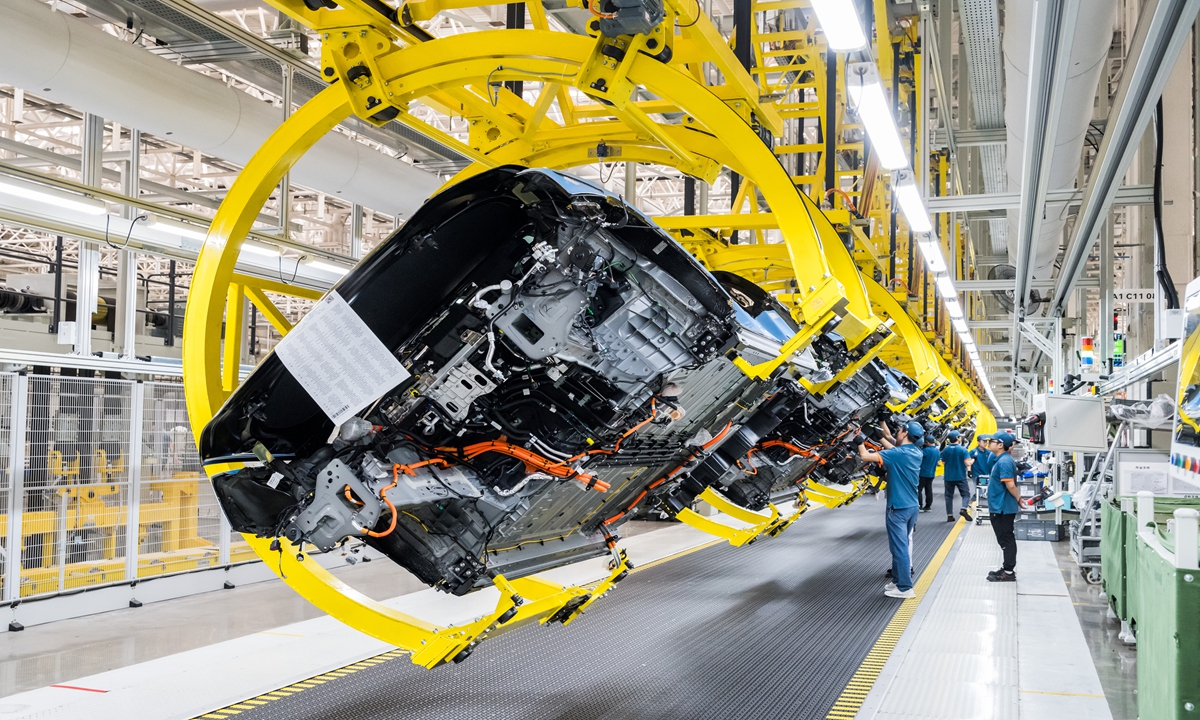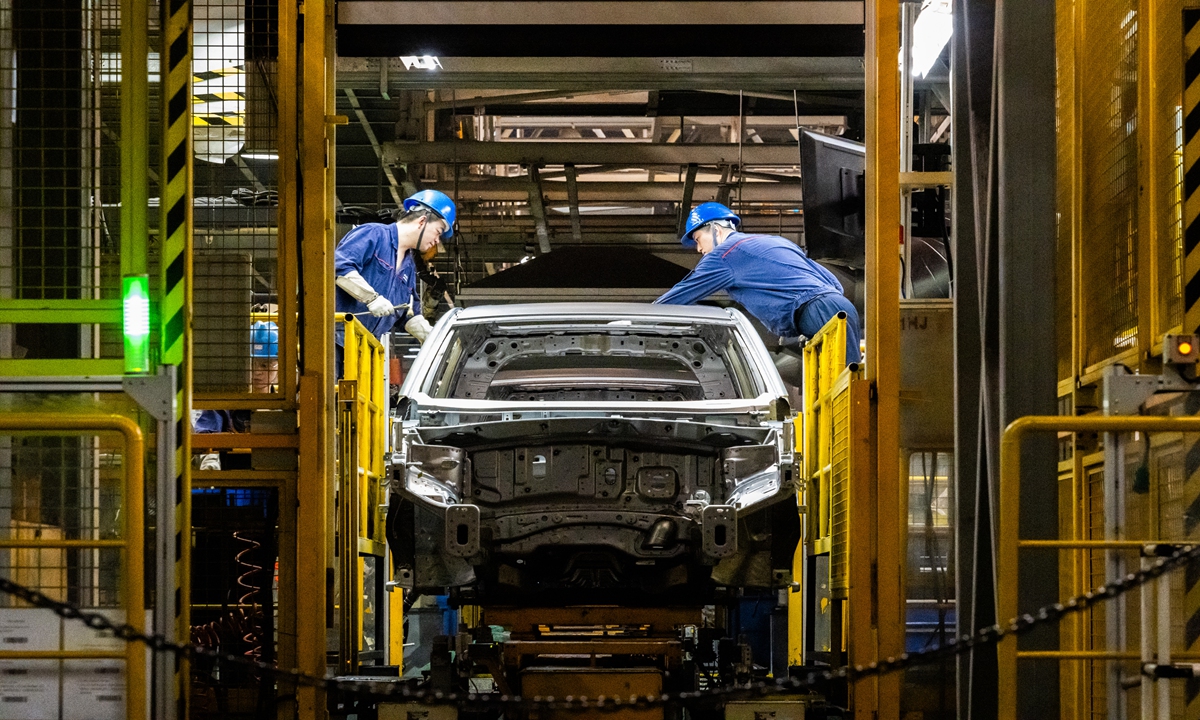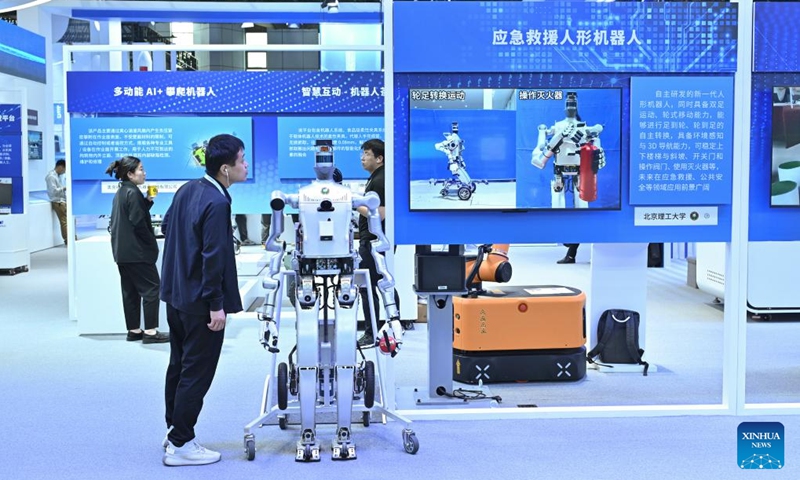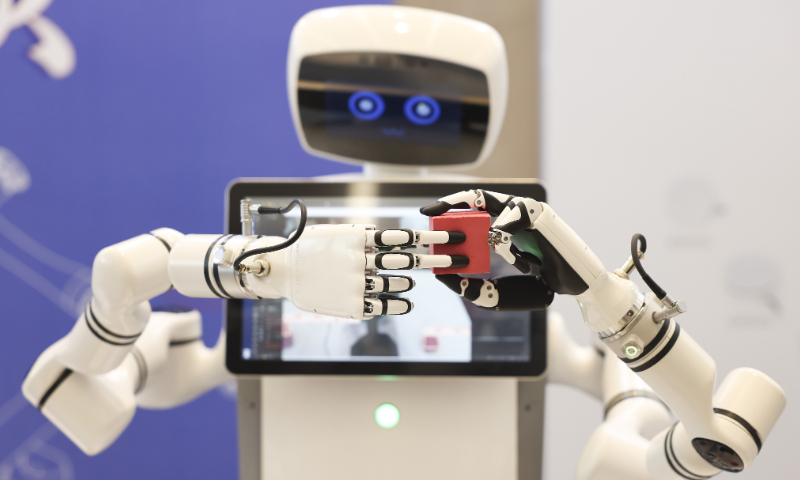China’s manufacturing sector takes on a new face, marked by rising automation and intelligence, as shown by Chongqing city
Manufacturing sector takes on a new face, marked by automation, intelligence and green push

Workers check the production process at a Seres Group's super factory in Southwest China's Chongqing city on May 20, 2024. Photo: Chen Tao/GT
Editor's Note: As the Chinese economy faced some challenges in recent years, some Western officials and media pundits have stepped up their smear campaign against China. They cherry-pick information and distort facts to hype their narratives such as "Peak China," but they always turn a blind eye to China's economic resilience and development potential. In order to set the record straight, the Global Times is launching a multimedia project, including in-depth articles, objective analysis and visual arts, to present a comprehensive and true picture of Chinese economy. This is the eighth installation of the series.
Automated robotic arms are operating seamlessly to execute sophisticated tasks at the assembly lines, while manufacturing components are accurately delivered by other robots - this has become the routine scene seen daily at one of China's leading electric vehicle (EV) makers Seres Group's super factory, located in Southwest China's Chongqing city.
And, the highly intelligent operations can also be spotted at another Chongqing-based factory, Changan Automobile, where an assembled car is able to hit the road in just 15 hours from the scratch.
The smart manufacturing procedure witnessed by the Global Times at the two factories is only a small part that mirrors the city's rapid development in high-end green manufacturing.
As China's southwestern industrial powerhouse with a dedicated focus on auto-making, Chongqing has played a vital role in supporting the national development with its own strengths from advancing indigenous innovation ability, forming complete industrial and supply chains to extending convenient logistical networks.
Innovative auto-making
Walking through Seres' super factory lanes, the Global Times noticed that the highly automated production process is conducted in a streamlined and intelligent manner, while each assembly procedure is sleekly and precisely implemented with minimal human oversight.
A wide range of intelligent technologies are adopted throughout the manufacturing process for a new-energy vehicle (NEV) coming off Seres' production line, according to Kang Bo, vice president of Seres.
Qualified raw materials which passed an initial blue light inspection will be handled by hundreds of robots through smart operation in the welding workshop, which creates a tightly stitched body with doors and frames being wielded together.
The body will pass a laser-radar detection system to the paint shop for several automatic procedures and will be transferred to the assembly line for parts installation. After an automated robotic inspection, a qualified NEV is ready to roll of Seres' production line, Kang told the Global Times.
The super factory has more than 3,000 robots with major procedures already realizing 100-percent automation, while a new car can be rolled off the production line in 30 seconds with the highest efficiency and accuracy, Kang said.
Not far from Seres' super factory, the production is also in full swing at a local Changan Automobile factory, as robots buzz with sparks and workers are busy facilitating manufacturing activities at key links.
A production line is capable of manufacturing four models at the same time without switching equipment, with a stable production capacity of 65 vehicles and up to 74 units at the top capacity. The average daily output can reach 1,300 vehicles with the maximum hitting 1,410 units, Hu Yuanxiang, a worker from the factory's welding shop told the Global Times.
Chongqing has been stepping up efforts in achieving its goal of constructing a trillion-yuan ($138 billion) world-class intelligent EV industry cluster. The steady progress has propelled the development of many auto-related enterprises in the city.
The auto industry is a mainstay industry of Chongqing with a massive market potential and high customer base. The complete upstream and downstream industrial chains have created a favorable business environment for the development of local companies, a responsible person in charge of the Beidou Intelligent Connected Vehicle Technology Co (BICV) told the Global Times.
BICV is a Chongqing-based company dedicated to the research, development, production, and sales of automotive intelligent connected products. The company has two smart manufacturing bases in Chongqing and East China's Jiangsu Province with an annual production capacity of 3.2 million sets, which is expected to reach 5 million sets in 2025.

Two workers at a Changan Automobile plant in Southwest China's Chongqing city on May 21, 2024. Photo: Chen Tao/GT
Smart industrial hub
In the first five months of 2024, Chongqing manufactured a total of 997, 000 vehicles with the annualized growth rate hitting 15.7 percent, ranking the first in the country. Among them, the city produced 306,000 EVs, a year-on-year increase of 144.1 percent, according to data released by local statistics bureau.
In addition to the ongoing innovative development, industry insiders and enterprises also outlined a slew of advantageous factors that have firmly backed up the growth of local manufacturing sector.
Chongqing has formed a complete industrial chain and improved the stability and efficiency of the supply chain by coordinating closely by the upstream and downstream enterprises, leading to a lower production cost and elevated industrial competitiveness, Changan Automobile said in a separate statement shared with the Global Times.
The company said that targeted measures supporting the auto sector's development have helped create a better business environment for the enterprises to operate, adding that the city's formation of an auto industrial cluster and efforts in cultivating talent helps the sector too.
The representative from BICV noted that Chongqing's unique landscape has natural advantages for conducting driving tests for smart vehicles, especially for trying out innovative technologies such as autonomous driving and high-precision positioning.
In a related development, the local operation of China-Europe freight train service has created a solid foundation for Chongqing's auto enterprises to step up their cooperation with global players.
The China-Europe freight train service has promoted the export of vehicles and auto parts from Chinese brands, while promoting projects from leading auto giants such as Porsche and Audi to settle down in Chongqing, with the import and export value of vehicles hitting nearly 70 billion yuan, Yuxinou (Chongqing) Logistics Co told the Global Times.
Amid China's continuing development in the EV sector, Chinese companies represented by Changan Automobile and Seres have been expanding international cooperation, despite facing increasingly protectionist moves from the US and the EU.
Kang said that the Seres' vehicles export to more than 70 countries and regions, with Germany, France and Italy being the major destinations of the company's two smart EV brands Seres and DFSK. Kang noted that the company will also deepen global cooperation by means such as setting up local sales companies and building factories overseas.
Changan Automobile noted that its first overseas production base was launched in Thailand in 2023 with a production capacity of 100,000 units in the first phase and 200,000 units in the second phase. The company is also considering setting up branches in regions like Europe.



